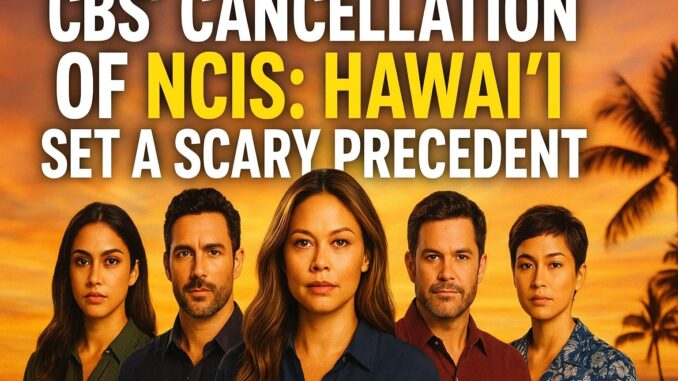
CBS’ Cancelation Of NCIS: Hawai’i Set A Scary Precedent
Television fans are no strangers to cancelations, but when CBS pulled the plug on NCIS: Hawai’i, it left viewers stunned. Not only was the series popular among fans, but it also represented a crucial step forward for diversity in primetime television. This decision, while shocking, may also signal a dangerous trend in how networks view storytelling, representation, and audience loyalty. Let’s break it all down.
Why NCIS: Hawai’i Mattered More Than Just Another Spin-Off
Unlike other spin-offs in the NCIS universe, NCIS: Hawai’i stood out. It introduced the franchise’s first female lead, Jane Tennant, played brilliantly by Vanessa Lachey. The show also embraced inclusivity by featuring LGBTQ+ characters and highlighting Hawaiian culture. It wasn’t just a procedural drama—it was a cultural milestone.
CBS’ Unexpected Move: Why Did They Cancel?
So, why would CBS ax a show that carried such weight? The official explanation leans on ratings and budgets, but fans aren’t convinced. Many argue that the network didn’t give the series enough time to grow. Others suspect the decision was more about shifting corporate strategies than actual viewer interest.
The Franchise Effect: Did Success Work Against It?
Ironically, NCIS is one of the most successful franchises on TV. With NCIS, NCIS: Los Angeles, and NCIS: New Orleans already in the bag, adding Hawai’i gave CBS another winner. But could franchise fatigue have played a role? Perhaps CBS felt the brand was oversaturated, even though audiences still tuned in.
The Diversity Dilemma: A Step Backward for Representation
One of the most painful parts of this cancelation is what it means for representation. Hollywood has long been criticized for sidelining diverse voices. Canceling NCIS: Hawai’i not only removes a strong female-led drama but also silences stories that brought Hawaiian culture and LGBTQ+ characters to the forefront.
Fans React: Outrage on Social Media
When the news broke, Twitter, Instagram, and Facebook exploded. Hashtags like #SaveNCISHawaii trended for days. Fans expressed disappointment, not just in losing the show, but in what it symbolized—a network backpedaling on progress.
The Business Behind the Curtain: Money vs. Storytelling
Networks don’t always cancel shows because they’re bad. Sometimes, it’s all about cost. Big productions like NCIS: Hawai’i require hefty budgets—locations, cast, action sequences, you name it. If CBS didn’t see a return on investment, the show became vulnerable, no matter how beloved.
Streaming Changed the Rules
Another factor? Streaming. With viewers migrating to platforms like Netflix, Hulu, and Paramount+, traditional network ratings don’t carry the same weight. CBS might be looking at shifting its resources toward streaming content, leaving shows like NCIS: Hawai’i caught in the middle.
A Scary Precedent for Future Shows
Here’s the big question: If CBS can cancel a groundbreaking, fan-loved series like NCIS: Hawai’i, what does that mean for future shows? Are networks becoming less willing to take creative risks? Will diversity-driven shows always be at risk of being cut short?
The Ripple Effect on the NCIS Franchise
Canceling NCIS: Hawai’i might not just affect fans of the show—it could damage the franchise as a whole. Viewers may lose trust in CBS’ commitment to keeping long-running series alive. And let’s be honest: audience trust is everything.
The Actors Caught in the Crossfire
Vanessa Lachey, Alex Tarrant, Yasmine Al-Bustami, and the rest of the cast delivered stellar performances. Now, they’re left hanging. For the actors, it’s not just about losing a paycheck—it’s about losing a platform where their representation meant something.
Could Fan Campaigns Save the Show?
In today’s world, cancelation doesn’t always mean death. We’ve seen fan-led campaigns save series before (Brooklyn Nine-Nine, anyone?). Could the same happen for NCIS: Hawai’i? The momentum is there, but it depends if streaming platforms like Paramount+ or Netflix decide to pick it up.
cBS’ Reputation at Risk
Networks walk a fine line between profit and loyalty. Canceling NCIS: Hawai’i risks damaging CBS’ image as a network that listens to fans. If too many viewers feel betrayed, they might switch to streaming competitors who seem more willing to take risks.
Comparisons With Other Shocking Cancelations
This isn’t the first time fans were blindsided. Shows like Firefly, Santa Clarita Diet, and Sense8 also fell victim to sudden cancelations despite fan loyalty. CBS’ move echoes these decisions, proving once again that popularity doesn’t always equal longevity.
The Broader Issue: Are Networks Out of Touch?
At its core, this isn’t just about NCIS: Hawai’i. It’s about whether traditional networks truly understand today’s viewers. Audiences crave representation, diversity, and fresh storytelling. Canceling shows that deliver those things makes networks seem disconnected from their own audience base.
What This Means for TV’s Future
Television is at a crossroads. The cancelation of NCIS: Hawai’i shows that networks may prioritize short-term gains over long-term cultural impact. If that’s the case, we may see fewer risks, fewer diverse leads, and fewer shows that actually matter.

Final Thoughts: A Cancelation That Sends the Wrong Message
CBS may have seen this as a business decision, but to fans, it feels like betrayal. NCIS: Hawai’i wasn’t just a show—it was representation, progress, and hope wrapped in one package. Canceling it sets a scary precedent that diversity-driven storytelling may never be safe on network television.
Conclusion
The cancelation of NCIS: Hawai’i is more than just another network decision. It’s a moment that forces us to question the priorities of television giants like CBS. Do they value cultural progress, or are they only chasing quick profits? For now, the answer doesn’t look good. But one thing is clear: fans aren’t ready to let go without a fight.